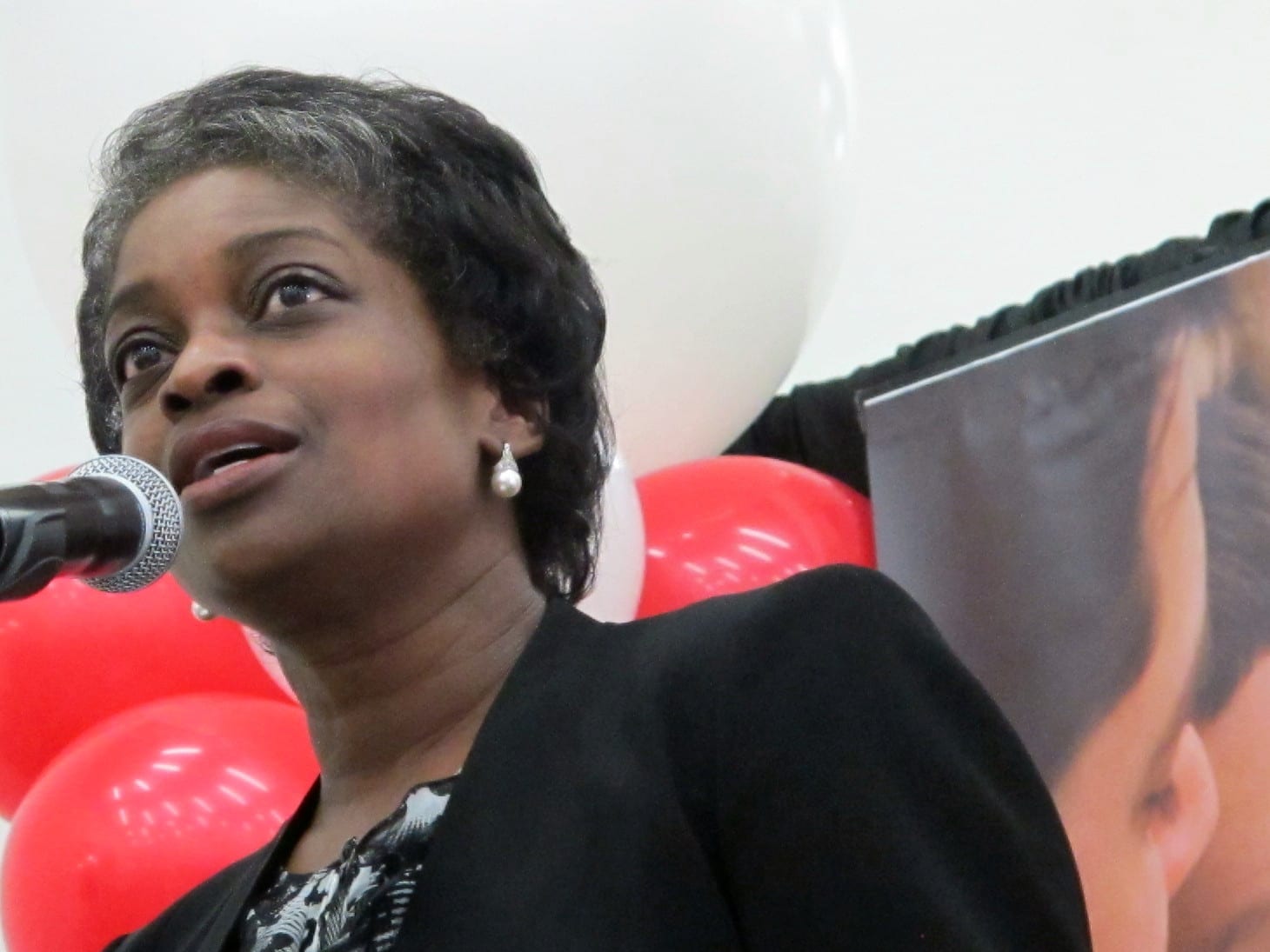This story was co-published with The Washington Post.
Rep. James E. Clyburn has been one of the most influential politicians in Democratic politics for a generation, but as the nation casts its gaze toward South Carolina ahead of Saturday’s primary, the state’s Black electorate is also looking to Clyburn’s three daughters for their thoughts on the 2020 primary cycle.
In an exclusive interview with The 19th, the trio of sisters — rarely together in their home state — gave a wide-ranging interview reflecting on their political upbringing and the 2020 climate.
“We’ve been a part of the political landscape, voluntary or not, for all of our lives,” said eldest daughter Mignon, a former commissioner at the Federal Communications Commission. “If there’s anything organic between the three of us, it’s politics and public service. People are trying to ask who [we’re] supporting and hoping that is going to forecast what the congressman is going to do.”
In the 2020 primary cycle, Mignon and middle sister Jennifer Clyburn-Reed helped multiple campaigns by facilitating events, making introductions, and dispensing advice.
“Smart candidates took the time to engage longtime Democrats in the state like the Clyburns from the beginning, recognizing their local political acumen and the respect many in South Carolina have for the family,” said Jerusalem Demsas, the former state communications director for California Sen. Kamala D. Harris, who exited the race in December.
Congressman Clyburn has represented South Carolina’s 6th Congressional District since 1993. Now in his 14th term, he’s also majority whip, making him the third-ranking Democrat in the U.S. House of Representatives behind Speaker Nancy Pelosi (Calif.) and Steny H. Hoyer (Md.). Clyburn is expected to announce his presidential endorsement Wednesday, reportedly of former vice president Joe Biden, who is flagging in the delegate count. It would be a much-needed boost before the Democratic primary in South Carolina, the most diverse state on the calendar to date.
Politics has loomed large over the entire family for nearly three decades. It is Clyburn’s late wife, Emily, who is credited with pushing him into elected office. She died Sept. 19 at age 81.
Their daughters all recalled civic engagement being central to their upbringing and voting behavior into adulthood.
“Mom and Dad took us when they went to vote until we could drive ourselves,” youngest daughter Angela said. “Every election, it didn’t matter what it was. I’m there every presidential, every gubernatorial, every city council, county council.”
Angela Clyburn, political director for the South Carolina Democratic Party, admitted missing one election since she turned 18, for an amendment.
“I was in college in Rock Hill and my mother called me and asked if I got my absentee ballot!” she said. “That was the last time I ever missed one.”
Jennifer, 50, remembered having to bring home her voter registration card before she could go out to party after turning 18.
She said their mother “instilled in us the importance of voting, of making a decision — and that once you made a decision, to stick with it,” she said. “All of this waffling, going back and forth … she was not a fan of that. But she also told us if there’s something you don’t like, do something about it.”
Mignon Clyburn, 57, registered to vote in high school and recalled the pride she felt at becoming “part of my parents’ posse.” She said she learned from her mother in particular the adage of not letting the perfect become the enemy of the good.
“They grew up in a very imperfect place, and in a very imperfect time,” she said. “That didn’t stop them from supporting candidates. You don’t throw away your family members because you don’t agree with them all the time.”
The trio of sisters, the Clyburns’ only children, say they have always had robust conversations about politics and don’t often come to a consensus about which candidates they’ll support. Jennifer Clyburn-Reed’s son, Walter Clyburn Reed, recently came out in support of Mayor Pete Buttigieg.
The New York Times reported that presidential candidate Tom Steyer is renting campaign space in South Carolina from a company owned by Jennifer.
She said her family has always encouraged independent thinking.
“Consensus is often built out of discourse,” said Clyburn-Reed, director of the Center for the Education and equity of African American Students at the University of South Carolina who taught public school for 25 years. “You have to be uncomfortable for a little while and work through that discomfort so that you can get to common ground. It’s okay to disagree, but it is not okay for you to be disrespectful.”
Mignon Clyburn said she has been more of a counselor this cycle, trying to assuage the anxieties of an electorate eager to oust President Trump.
“I can’t tell you how many conversations I’ve had where people are in a state of panic and fear because they want a decision to be made,” she said, adding that many also lament the absence of candidates of color from the debate stage and the ballot. “People want finality right now. That’s what’s frustrating.”
Her younger sister, Angela, 46, agreed and said that in the past year, she has often found herself playing the role of peacemaker with friends, particularly on social media.
“I find myself trying to tamp down the rage and the vitriol against candidates one way or the other,” she said. “The language that is used, the tone, the sentiment … sometimes it’s destructive. We need to come together in the end. A lot of us want change in the White House, and the only way that’s going to happen is if we come in droves in Obama numbers for the nominee, whoever that is.”
None of the sisters is expected to publicly endorse a candidate before Saturday’s election. With days to go until the primary, they hadn’t even discussed with one another who they’ll cast their ballots for. But they said they are all united in supporting the eventual nominee — and holding them accountable should they win in November.
“If you ask for our votes and we deliver, we have to see a return on our vote,” said Mignon Clyburn. “This is why this election’s so pivotal. This can’t just be, ‘Let’s do it the same old way.’”






